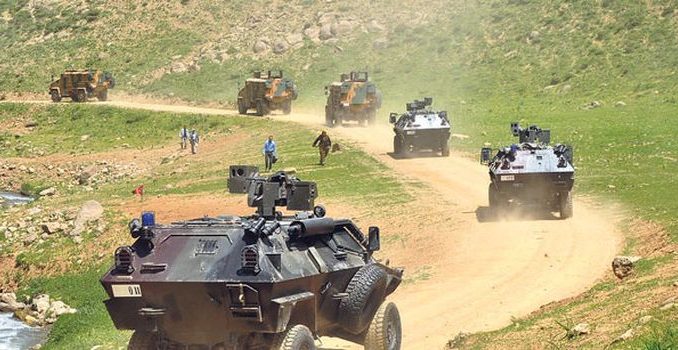
President Obama is fully aware of the fragile coalition that exists between the U.S. and Russia which has enabled the Syrian regime to gain the upper hand.
But he is also aware of the threat from Saudi Arabia and Turkey of wanting to intervene militarily on the ground in Syria, and takes the threat of invasion from NATO ally Turkey seriously.

BYPASS THE CENSORS
Sign up to get unfiltered news delivered straight to your inbox.
You can unsubscribe any time. By subscribing you agree to our Terms of Use
Latest Video
The Syrian war is reaching a climax and the battle lines are changing.
Kurdish forces are securing the border with Turkey, liberating villages and cutting off supply lines to Isis and non-Isis terrorists in northern Syria. The Syrian army is cutting off and surrounding the opposition and jihadi factions in Aleppo, and in the northern part of the province is cutting off the opposition from the Turkish border.
President Obama has spent one hour and 20 minutes on the phone with Turkish President Recep Tayyip Erdogan, urging him restraint in Syria.
The Independent reports:
“The Turks and the Saudis are always trying to nudge the US into sending ground troops to Syria, but they are not going to launch a large-scale military intervention on their own,” said a former senior diplomat in the Middle East. Turkish and Saudi policy on Syria has hitherto been full of threats and bombast, but it is dangerously mercurial and some form of military action cannot be ruled out, even if it is opposed by the US or Russia.
The US knows that Turkish military action would be directed primarily against the Syrian Kurds and the People’s Protection Units (YPG) that have been America’s most effective ally fighting Isis. In his conversation with Mr Erdogan, Mr Obama is reported to have said that the YPG should not seek to exploit recent gains by the Syrian army north of Aleppo to take more territory. But at the very moment that the two men were speaking, the success of US-YPG co-operation was underlined by a little-reported victory in north-east Syria, where the Syrian Democratic Forces, a proxy for the YPG, captured the important Isis stronghold of Shadadeh with the help of US air strikes.
There is a further reason why the US would be loath to give up its military alliance with the Syrian Kurds. “Over a year ago, the Americans realised that the Turks were not going to close their border with Syria to Isis and other jihadis on its northern, Turkish side,” said the former diplomat. “So the Americans decided to close the border on the southern side, with the help of the Syrian Kurds.” It is this plan which is now close to fulfilment.
President Obama’s policies in Syria since the rise of Isis in the summer of 2014 have always made more sense than critics supposed. Prior to the fall of Mosul, the White House had miscalculated the degree to which the Syrian war could left to fester without destabilising the rest of the region. Mr Obama unwisely compared the movement that became Isis to a junior basketball team seeking to play in the big leagues.
But Mr Obama has a far more acute sense than most other politicians about the ease with which the US, or any other foreign power intervening in Syria, Iraq or Afghanistan, can become plugged into local confrontations and disputes. I once asked General David Petraeus, the commander of the 101st Airborne Division in Mosul in 2004, what was the most important advice he could give to his successor. He said, after reflecting for some moments, that his advice would be “not to align too closely with one ethnic group, political party, tribe, religious group or social element”.
This approach is sensible, though scarcely feasible, because a foreign power under pressure acquires local allies where it can find them without inquiring too closely into their character and motives. For instance, Turkey has pushed for the US to support “safe havens” for displaced people and moderate armed opposition in northern Syria. This sounds benign and even humanitarian until one realises that the idea is directed primarily at stopping the Kurds from controlling more territory, and that the Turkish definition of “moderate” appears to include extreme jihadis such as Ahrar al-Sham that usually fight in alliance with the al-Qaeda affiliate, Jabhat al-Nusra.
It is right to be sceptical of “tail-wags-the-dog” explanations in which big powers shift the blame for their more culpable actions to local allies. But it also true that one of the main reasons for the disastrous outcome of foreign interventions in Libya, Iraq and Afghanistan since 2001 is that they have been justified as actions against a much-demonised enemy and in favour of an over-praised, moderate, secular opposition which did not exist.
In Iraq in 2003, the US dissolved the Iraqi army; this is often recalled as a foolish and unnecessary act by the head of the US occupation, Paul Bremer, which had the disastrous consequence of alienating the Sunni officer class and promoting the rise of al-Qaeda in Iraq. But I was in Baghdad at the time and, in reality, the dissolution of the army was being recommended to the Americans by the Kurdish and Shia leaders, representing 80 per cent of Iraqis, who rightly saw the Iraqi security forces as the most important institution through which the 20 per cent Sunni minority had traditionally held power. The Americans and allies such as the British were unwittingly presiding over a sectarian and ethnic revolution which was bound to have explosive consequences.


